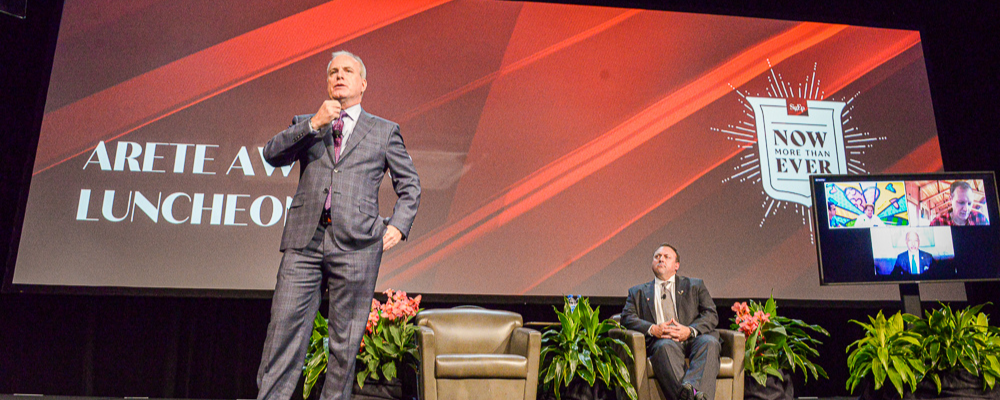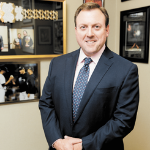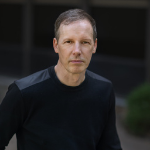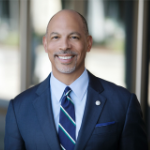
At the Arete Luncheon, brothers and friends gathered to award several notable alumni with the SigEp Citation in honor of their professional accomplishments. Fraternity officials were on hand to present the Citation recipients with their awards and share highlights of their careers with the audience. Recipients participated in a panel discussion that drew out the stories and wisdom from their wealth of experience.
Past Grand President Garry Kief, Southern California ’70, presented the SigEp Citation to Romero Britto, Miami (Florida) Renaissance.
 Britto, an artist and founder of the Happy Art Movement, has exhibited in museums and galleries in more than 120 countries. His art contains a lively fusion of bright colors and whimsical patterns and first gained public attention as part of Absolut Vodka’s widely popular Absolut Art campaign in 1988.
Britto, an artist and founder of the Happy Art Movement, has exhibited in museums and galleries in more than 120 countries. His art contains a lively fusion of bright colors and whimsical patterns and first gained public attention as part of Absolut Vodka’s widely popular Absolut Art campaign in 1988.
Other brands, including Mattel and Coca-Cola, took notice and commissioned works for their own ads. His art is also widely collected, with Britain’s Prince Charles and Super Bowl champ Tom Brady among the many fans who’ve purchased pieces.
Britto’s public art installations in New York’s JFK Airport, London’s Hyde Park and other locations around the world have brought joy to millions of people as they go about their everyday activities. His popularity has made Britto the most widely licensed artist in history, with images of his art found on everything from watches to neckties to a limited-edition Monopoly game.
“At the end of the day, you can teach someone all kinds of skills, but you can’t teach somebody to be honest or kind — all the beautiful things we want in a friend or a coworker,” Britto said. “Once you have that, people get inspired, and they want to be with you, and they want to promote you.”
Citation recipient Dr. Jeffrey Dugas, North Carolina State ’90, was introduced by Educational Foundation Trustee Dr. Grant Buttram, North Carolina State ’93.
 An orthopedic surgeon, Dugas is one of the country’s most sought-after experts on sports injuries and has operated on professional, college and high school athletes. He has innovated the field, developing an alternative to Tommy John surgery that can cut rehab and recovery time in half for athletes sidelined with debilitating elbow injuries. He also volunteers as the team physician for Troy University and as medical director for USA Cheer.
An orthopedic surgeon, Dugas is one of the country’s most sought-after experts on sports injuries and has operated on professional, college and high school athletes. He has innovated the field, developing an alternative to Tommy John surgery that can cut rehab and recovery time in half for athletes sidelined with debilitating elbow injuries. He also volunteers as the team physician for Troy University and as medical director for USA Cheer.
In addition to running a thriving medical practice, Dugas is also an entrepreneur. He and a partner founded Dread River Distilling Co., the largest distillery in Alabama. The facility produces a variety of small-batch craft spirits and also serves as an event space.
During the pandemic, Dugas shifted from producing beverages to making alcohol-based hand sanitizer and cleaning solutions. He gave the products away to assist local health care facilities and essential businesses.
“The foundation of our clinic is focusing on the outcome,” Dugas said. “That sets a bar in our profession, and it’s the same in a chapter on campus. Guarantee the outcome for a young brother who is going to join — don’t settle for anything less than an experience that is so good.”
After finding personal commonalities with each other recipient, Dugas said, “It’s amazing how little it takes to find connection between brothers, even though the four of us have never met.”
Past Grand President Bill Tragos, Washington-St. Louis ’56, presented the Citation to Jim McKelvey, Washington-St. Louis ’87.
 McKelvey is an entrepreneur best known for founding Square, the company that has revolutionized how small businesses process credit card transactions since its launch in 2009. Today, businesses rely on Square for its innovative card reader, payroll processing and a variety of other services.
McKelvey is an entrepreneur best known for founding Square, the company that has revolutionized how small businesses process credit card transactions since its launch in 2009. Today, businesses rely on Square for its innovative card reader, payroll processing and a variety of other services.
Due to Square’s phenomenal growth, the company had a difficult time finding employees with technical skills. So, McKelvey founded LaunchCode, a nonprofit offering training and job placement assistance, to bring more people into the tech industry. He’s leveraged his business experience in a role as deputy chair of the Federal Reserve Bank of St. Louis.
McKelvey is not only a trustee at Washington University in St. Louis, but also supported his alma mater by providing the lead gift for a new school of engineering named in honor of his father, who was dean of the school for nearly 30 years. He’s contributed his wealth of expertise to SigEp by serving as a guest speaker for chapter events at Missouri Beta and Missouri Gamma.
When asked which SigEp cardinal principle means the most to him, McKelvey said, “The one I think most about is virtue. We live in a more and more anonymous world — it’s easy to do things remotely. With the ability to be anonymous comes more responsibility to conduct ourselves as if people were looking. Virtue is even more important as we lose the oversight of others.”
Past Grand President Rick Bennet, Central Missouri ’74, presented the Citation to Eugene A. Woods, Pennsylvania State ’86.
 Woods is president and CEO of Atrium Health, a nonprofit healthcare network with more than 70,000 employees and medical facilities in four states. In 2020, Woods oversaw a merger that added Wake Forest School of Medicine in Winston–Salem, North Carolina, to the Atrium portfolio. With plans underway to build a second campus of the medical school in Charlotte, Woods is committed to training future generations of medical professionals.
Woods is president and CEO of Atrium Health, a nonprofit healthcare network with more than 70,000 employees and medical facilities in four states. In 2020, Woods oversaw a merger that added Wake Forest School of Medicine in Winston–Salem, North Carolina, to the Atrium portfolio. With plans underway to build a second campus of the medical school in Charlotte, Woods is committed to training future generations of medical professionals.
A former chair of the American Hospital Association, Woods has been at the forefront of the battle against COVID-19. Under his leadership, Atrium distributed more than two million masks in Charlotte and pioneered the “virtual hospital” concept in which patients with mild symptoms are monitored remotely to make hospital beds available for critically ill patients.
Woods also sits on North Carolina’s health disparities and economic recovery task forces and chairs the Federal Reserve Bank of Richmond.
Woods said, “The SigEp values are only real to the extent that you use them and live them every single day in real action. When I think of Virtue, I think it’s akin to integrity and not being a bystander. When you see something that’s not right, take a stand.” He pointed to SigEp’s bold 1959 decision to allow membership without racial restrictions as an example of a virtuous stand.
“We’re in a time right now when character and how you interact with people who have vastly different views — as brothers, how do we deal with that? It should start from a place of brotherly love — for people who don’t look like you, who don’t share the same views.”









Leave a Reply